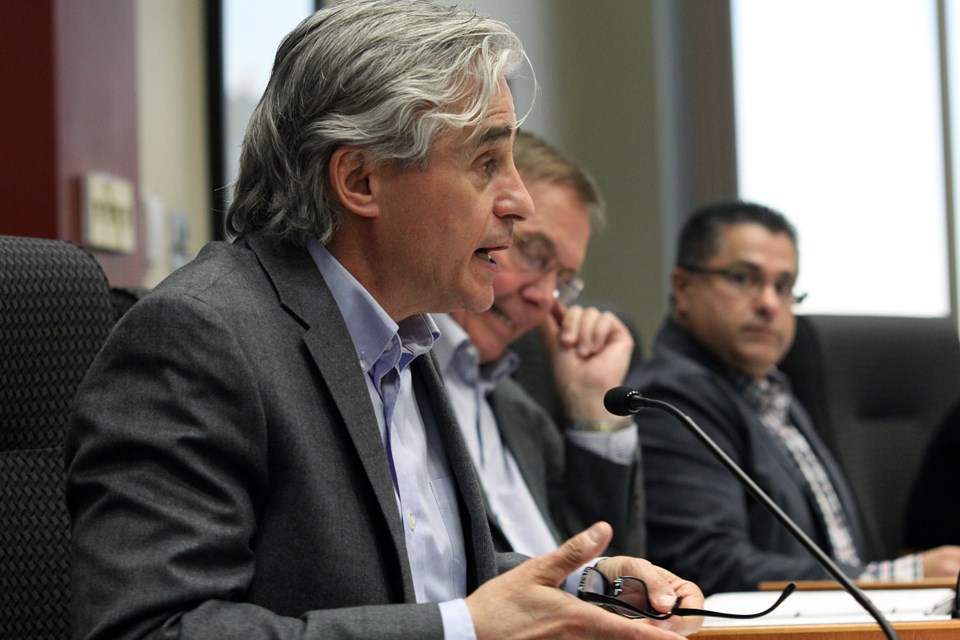THUNDER BAY – City leaders pressed for action on issues including mental health and addiction treatment, policing, and a proposed Thunder Bay science centre over several days at the Association of Municipalities of Ontario (AMO) conference in Ottawa this week.
The city’s delegation included Mayor Bill Mauro, his policy assistant Jeff Howie, Coun. Brian McKinnon, and city manager Norm Gale and held eight meetings with provincial ministers or parliamentary assistants.
Mauro called the conference, held in person for the first time in nearly three years, a good opportunity to catch the ear of decision makers on important files.
The mayor pointed to continued conversations with Associate Minister of Mental Health and Addictions Michael Tibollo over calls for increased funding for crisis and treatment services in the region.
Mauro said he thanked the government for its announcement earlier this year of two-year funding for 34 treatment beds through the St. Joseph’s Care Group and Dilico Anishinabek Family Care, but reiterated calls to support a vision for a new 40-bed, 24/7 crisis centre.
The proposal was developed by dozens of local health and social service agencies. That came in response to a 2021 request from Tibollo for a formal proposal in after the city presented data from the coroner’s office indicating the opioid overdose crisis is even more severe in the region than in Southern Ontario, Mauro said.
“It led to an announcement from the minister of 34 treatment beds… so it was a good piece for us and a good win – and I thanked the minister for his announcement, because it certainly is a help,” he said.
“They feel like they’ve moved the yardstick significantly, and I think it’s fair to say that they have… However, we did press the case that the formal proposal that had been developed by the agencies was much more comprehensive and extensive than what the announcement from the province entailed.”
Mauro also shed some new light on the province’s potential concerns with the proposal.
“The biggest challenge from the minister’s perspective was he wasn’t interested or didn’t feel he could fund the capital component of that proposal,” the mayor said, pegging it as a $20 to $30 million capital project. “He wanted to see most of the money go into operational work. The agencies felt this wrap-around service comprehensive proposal was the way to go.”
Another priority raised with provincial leaders was the possibility of provincial support for a proposed science centre on the city’s waterfront.
The city’s delegation conveyed support for the project in a meeting with Neil Lumsden, Minister of Tourism, Culture and Sport.
Mauro called the science centre, which he said would likely amount to a $30 to $50 million build, an exciting part of the city’s cultural and economic future.
“It would be a significant capital project, and a great addition to the waterfront, should it move forward,” he said.
The city’s delegation also discussed policing issues in a meeting with Solicitor General Michael Kerzner, including a Thunder Bay Police Service request to locate a forensic pathology unit in the city, allowing post-mortem investigations to take place locally.
The move was recommended in the Office of the Independent Police Review Director (OIPRD)’s 2018 “Broken Trust report to address issues of systemic racing in local policing.
“The police would like to have it, the city would like to see it established in Thunder Bay, [and] it was a recommendation in the OIPRD report that came down,” Mauro said.
Delegates welcomed the presence of newly elected MPP Kevin Holland at many of their meetings with provincial leaders.
“We do have somebody in government who’s going to be involved directly,” said McKinnon. “That was sort of a bonus as well.”
Holland, who also serves as parliamentary assistant for municipal affairs and housing, plans to connect with the coalition behind the mental health and addictions crisis centre proposal, said Mauro.
In an interview, Holland said he was aware of the crisis centre proposal, and intends to follow up with the city and other stakeholders to learn more about it after returning to the riding from his first sitting at Queen’s Park.
“We heard a lot of discussion from communities across the whole province for the need for more mental health and addiction services,” he said.
While he said there’s little doubt of the need for more services, Holland isn’t sure that means the province needs to provide more funding for addictions treatment.
He’s hoping to explore possibilities to “maximize” existing funding in meetings with service providers, he said.
“I think we can realize some savings in this process, so we do see the dollars spent better on delivery of the programs – I’m not saying it’s not now, but that’s what I hope to find out,” he said.
“We can always make the argument for more spending being required. I’m not saying we don’t need more money, I just really want to go through this process, find out where we’re at and what we need, and make a decision based on that information.”
Note: This article has been updated with comment from MPP Kevin Holland
